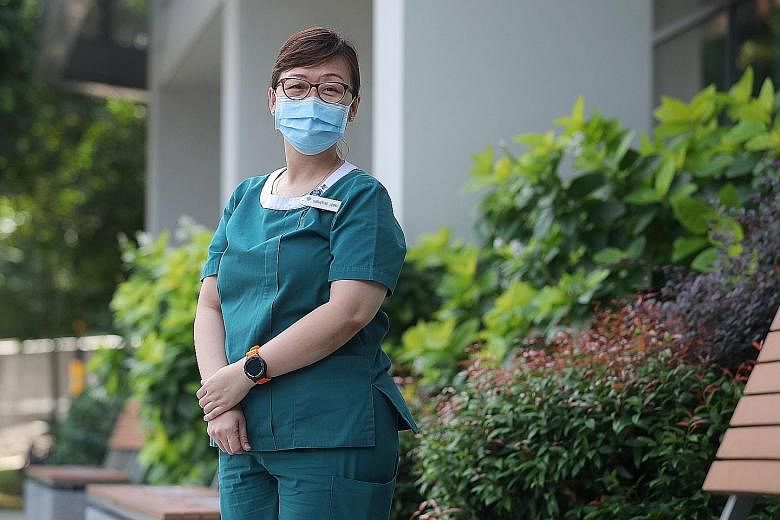KATHERINE LEONG, 49
Assistant director of nursing, National University Hospital (NUH)
Advanced practice nurse, Khoo Teck Puat - National University Children's Medical Institute, NUH
The migrant workers who streamed out of the buses and stood in front of the community care facility (CCF) in Tuas South looked dazed and nervous.
But they seemed more at ease when they saw the group of healthcare workers, clad in thick personal protective equipment (PPE), waving to and welcoming them.
Ms Katherine Leong, 49, who led the nursing team at the Tuas South CCF, knows a smattering of Bengali and Tamil from meeting patients and families as an advanced practice nurse with the Khoo Teck Puat - National University Children's Medical Institute at the National University Hospital (NUH).
"When the migrant workers arrived, I greeted them by saying 'kemon acho', which means 'how are you' in Bengali," said Ms Leong, who is also the assistant director of nursing at NUH.
"The brothers laughed and thought it was amusing, and greeted me back, and that broke the ice a little," she added, referring to the migrant workers.
Ms Leong and her team of 28 NUH nurses and locum nurses, along with the medical team, made it a point to call the workers brothers.
The Tuas South facility, the National University Health System's first CCF, was set up in mid-May to house about 1,600 Covid-19 patients who were asymptomatic or had mild symptoms.
In late April, Ms Leong led the nursing team in setting up the facility and was deployed there until early last month.
Her team was in charge of setting up a medical post, training the non-medical staff on infection control and how to properly don and remove PPE, and taking care of the migrant workers.
"Once, a migrant worker came up to me and said: 'Ma'am, I give you money, you buy phone for me.' His phone was broken, and he hadn't spoken to his family in five days.
"During a nurses' meeting, a colleague told me she had an old phone that she could pass to him."
Ms Leong also fondly recalled a helpful Indian migrant worker in his 40s who helped the nurses teach the patients how to measure and record their vital signs on tablets.
"He spontaneously went to different groups to teach them how to use the equipment to measure blood pressure and take temperature.
"Throughout his eight-to 10-day stay, he would come to the admissions area at 10am, when the buses started arriving, and at noon, he wouldn't go for lunch because more migrant workers were coming. We had to insist that he go and eat before returning," she said.
Ms Leong said the workers were appreciative of being taken care of in the CCF. "They always said 'thank you so much'. If we were sweating through our PPE, our hair damp and goggles fogged up, the brothers would feel bad for us and say 'Ma'am, very hot, ah. Sweat too much'.
"One of my nurses jokingly replied, 'Never mind. It's like a sauna, can lose weight'."












